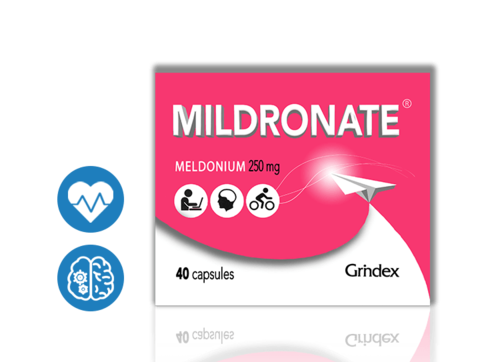International Non-Proprietary Name (INN): Meldonium
Dosage Form: capsules (250 mg or 500 mg)
Structure: 1 capsule contains:
Active ingredient: Meldonium Dihydrate – 250mg/500 mg;
Excipients: potato starch, colloidal silicon dioxide and calcium stearate;
capsule (body and cap): titanium dioxide (E 171) and gelatin.
Description:
Hard gelatin capsules (in white colour), inside white crystalline powder with a weak odor. The powder is hygroscopic.
Pharmacological classification: metabolic means
ATC code: С01ЕВ
Pharmacological action: antianginal, angioprotective, antihypoxic and cardioprotective.
MILDRONATE®
PHARMACODYNAMICS
Meldonium is a synthetic analogue of gamma-butyrobetaine (GBB), a substance which exists in every cell of the human body. It inhibits gamma-butyrobetaine dioxygenase, reduces the synthesis of carnitine and transport of long-chain fatty acids through cell membranes, prevents the accumulation in cells of activated forms of unoxidized fatty acids (acylcarnitine and acyl-coenzyme A derivatives).
Under conditions of ischemia Mildronate restores the equilibrium between the processes of oxygen delivery and its consumption in cells, prevents the violation of ATP (adenosine triphosphate) transport; simultaneously, it activates glycolysis, which proceeds without additional consumption of oxygen. As a result of carnitine concentration decrease, GBB (gamma-butyrobetaine) with vasodilating properties is intensively synthesized. The action mechanism determines the variety of pharmacological effects: increasing efficiency, reducing the symptoms of mental and physical overstrain, the activation of cell-mediated and humoral immunity, cardioprotective action. In the case of acute ischemic damage to the myocardium meldonium slows the formation of the necrotic zone, shortens the rehabilitation period. With heart failure increases myocardial contractility, increases physical activity tolerance, reduces the incidence of angina attacks. By acute and chronic ischemic disorders of cerebral circulation improves blood circulation in the ischemic focus and promotes redistribution of blood in favor of the ischemic site. Effective in the case of vascular and dystrophic pathology of the fundus vessels. Also there is a tonic effect on the central nervous system and the elimination of functional disorders of the somatic and autonomic nervous system for patients who suffer chronic alcoholism with the abstinence syndrome.
When it comes to increased physical activity, meldonium increases the body’s resistance and the ability to restore energy reserves quickly, therefore Mildronate is used to enhance physical and mental performance.
PHARMACOKINETICS
After ingestion the drug is absorbed rapidly, its bioavailability is 78%. Maximum concentration (Cmax) in the blood plasma is achieved within 1-2 hours after ingestion. The compound is metabolized mainly in liver with the formation of 2 major metabolites, which are excreted by the kidneys. The half-life (T½) for oral administration is 3-6 hours depending on the dose.
INTENDED USES (FOR CAPSULES 250 MG)
Low efficiency, mental and physical overload.
INTENDED USES (FOR CAPSULES 500 MG)
Low efficiency, mental and physical overload, withdrawal syndrome in case of chronic alcoholism (in combination with specific therapy). In complex therapy of patients with coronary heart disease (angina, myocardial infarction, etc.), chronic heart failure and dyshormonal cardiomyopathy, as well as subacute and chronic cerebral circulation disorders (after stroke, cerebrovascular insufficiency, etc.)
CONTRAINDICATIONS
Hypersensitivity to Meldonium or other components of the drug, increased intracranial pressure (caused by violation of the venous outflow or intracranial tumors), age below 18 years (effectiveness and safety not guaranteed), pregnancy and lactation.
With Caution:
Liver and / or kidneys diseases.
DOSAGE AND ADMINISTRATION
250 mg Capsules:
The daily dosage for adults is 500 mg (2 caps.). You can take either the entire dose in the morning or divide into 2 doses twice a day. Duration of the treatment course is 10-14 days. If necessary, repeat after 2-3 weeks.
500 mg Capsules:
- Coronary heart disease (angina, myocardial infarction), congestive heart failure and dyshormonal cardiomyopathy: in complex therapy, 500 mg -1 g 1-2 times per day orally. Duration of the treatment course is 4-6 weeks. For dishormonal cardiomyopathy – as a part of complex therapy, 500 mg orally once day. Duration of the treatment course is 12 days.
- Subacute and chronic disorders of the cerebral circulation (stroke and cerebrovascular insufficiency): after completion of the Mildronate injection therapy continue to take the capsules orally as a part of the complex therapy, 500 mg – 1 g per day. Apply the whole dose at once or divide it into 2 doses and take twice a day. Duration of the treatment course is 4-6 weeks. For patients with chronic disorders it is prescribed to take 500 mg orally once day as a part of complex therapy. The total course of treatment takes 4-6 weeks. It is possible to repeat the treatment (usually 2-3 times a year) after doctor’s consultation.
- Reduced working capacity; mental and physical overstrain (including the athletes): It is recommended to take 500 mg orally twice a day. Duration of the treatment course is 10-14 days. If necessary, the therapy can be repeated after 2-3 weeks. Athletes are recommended to use 500 mg -1 g twice a day before training. Duration of the standard course is 14-21 days during preparatory period, and 10-14 days during the competition.
- Alcohol withdrawal syndrome (chronic alcohol use): in combination with specific therapy take 500 mg 4 times a day orally. Duration of the course is 7 – 10 days.
SIDE EFFECTS
Rarely: allergic reactions (redness and itching of the skin, skin rash, swelling, hives or angioedema), dyspepsia and headache.
Very rarely: hyperexitability, tachycardia, general weakness, eosinophilia, hypotension and hypertension.
Overdose:
The cases of Mildronate overdose are not described. The drug toxicity is low and cannot cause side effects, dangerous to the health of patients.
Symptoms: reduced blood pressure, accompanied by headache, tachycardia, dizziness and general weakness.
Treatment: symptomatic.
INTERACTION WITH OTHER DRUGS
Meldonium can be used simultaneously with prolonged forms of nitrates and other antianginal agents, cardiac glycosides and diuretics. It can also be combined with anticoagulants, antiaggregants, antiarrhythmics and other drugs that improve microcirculation.
Meldonium can enhance the action of nitroglycerin, nifedipine, coronary deglutants, some hypotensive drugs, cardiac glycosides, beta-blockers, other antihypertensives and peripheral vasodilators.
Simultaneous use together with other meldonium-containing drugs is not allowed since the risk of undesirable reactions may increase.
SPECIAL INSTRUCTIONS
In view of the possible stimulating effect, it is recommended to apply Mildronate no later than 5 pm.
Patients with chronic liver and kidneys diseases should be careful with the long-term use of the drug.
If you need to use the drug longer than for a month, you should consult a doctor.
There is not enough data on the use of Mildronate for children younger than 18 years.
Pregnancy and lactation:
The safety of the drug during pregnancy is not established. Therefore, to avoid possible adverse effects on the fetus, do not use Mildronate during pregnancy.
It is not known whether meldonium is excreted in breast milk. If you need to use the drug during lactation breastfeeding should be discontinued.
Influence on the ability to drive vehicles and operate mechanisms: no data.
Terms of release from pharmacy: on prescription.
Storage conditions: store in a dry place at temperatures no higher than 25°C. Keep out of reach of children.
Shelf life: 4 years. Do not use beyond the expiration date printed on the package.
Country of manufacture: Latvia

